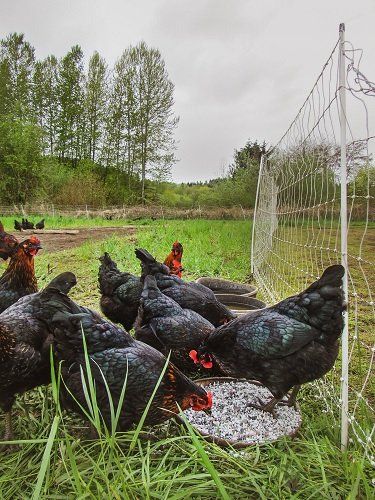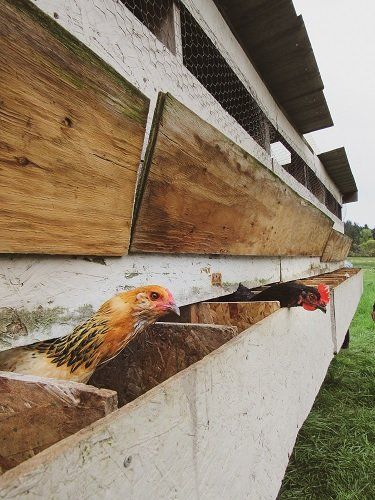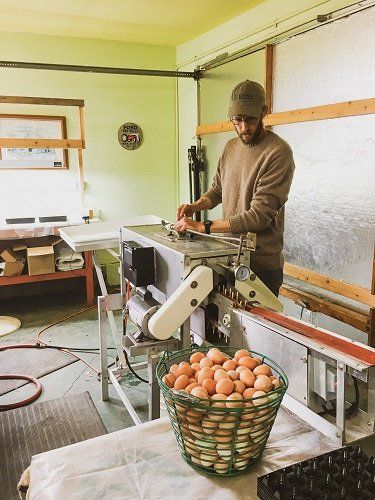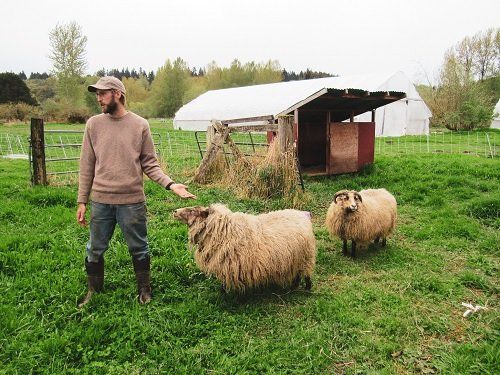Early Bird Farm Tour
One of my favorite things about Marlene’s is that I always know who and where my farm-fresh products come from. Recently, a few Marlene’s employees and I were able to visit a local farm that supplies us with some of the best organic, pasture-raised chicken eggs around. The early bird may get the worm, but the birds at Early Bird Farm get their fair share of a whole lot more than just a couple of night crawlers.
Rawley and Rebecca Johnson bought Early Bird Farm in 2013, located on the outskirts of Tacoma, Washington, off a winding road in the Puyallup River Valley. Aging cottonwoods line the bubbling creek that wanders behind their property and resident bald eagles patrol the skies while soaring high above the fields and streams. Though the traffic-ridden River Road and Pioneer Avenue are only a stone’s throw away (depending on your arm), the clean air and quiet farmlands seem to slow down time and transport you to the country.
Early Bird Farm sits on 10 acres of open pasture land that Rawley and his family get to fill up with crops and animals – “Much like an artist fills up a blank canvas,” he muses. Rawley truly enjoys the creative potential that the empty land offers and chooses to create a highly diverse farm environment flourishing with fruit trees, berries, honey bees, sheep and over 50 different kinds of vegetable crops. Oh, and did I mention his 500 egg-laying hens?
As our tour of the farm begins, Rawley leads us towards the distant pastures where hundreds of hens scuttle about and peck their way through the tall grass. Roosters survey their flocks and keep a close watch on their ladies.
The Johnsons' favorite egg-layer is the Black Star chicken, a beautiful and friendly cross between a Barred Plymouth Rock hen and a Rhode Island Red rooster, whose feathers glow a brilliant green, blue and purple in the sunlight. Another favorite bird of theirs is the Ameraucana chicken, a shy and quiet bird who lays brilliant blue eggs and prefers to keep its distance out in the pasture. I try to not be personally offended as they dramatically flee from my welcoming arms towards the farthest corners of the farm.
We watch Rawley prepare the chickens’ feed, and it’s almost comical to witness the real pecking order that has been established within the flock. Enthusiastically desperate clucks and coos fill the air as hordes of hens gather around.
No matter what hierarchy has been adopted among them, they are all treated to certified organic Scratch and Peck feed that is milled locally in Burlington, Washington. Rawley ferments their feed in water for 3 days, creating a chicken-approved probiotic potion that increases digestion and nutrient bioavailability, plus raises its protein content. The added water also keeps his hens hydrated during hot summer days.
“They eat every last bit,” Rawley says, impressed, “so there isn’t any wasted feed.” Understandable – who can resist that sweet, yeast-like scent of fermented chicken feed, am I right?
In addition to their probiotic feasts, chickens also enjoy eating rocks. Yep, rocks. The old saying “As rare as hen’s teeth” may sound like a silly figure of speech, but it actually rings true. Chickens really don’t have teeth, so they rely on eating small rocks that get stored in their gizzard (a super muscle-y stomach) to help grind up food. And since Rawley’s birds eat a whole grain feed, it’s especially important for them to have a strong and healthy gizzard to keep their digestive systems working well. The Puyallup Valley bottom soil also has a scarcity of rocks, so he makes sure to have some available to his hens at all times.
After visiting the chickens in pasture and collecting a few surprisingly heavy baskets of eggs, Rawley leads us to the farm house. We pass by flowering apple blossoms, neighboring horses (there’s a pun in there somewhere), and a pair of sweetheart Icelandic sheep whom Rawley rescued as babies – they follow his every move with their dreamy eyes and over-fluffed bodies as he introduces us.
We finally make our way indoors and Rawley shows us his ancient egg-cleaning machine, straight out of a time warp. This thing looked like it was the first “machine” ever invented, but it still continues to handle cleaning around 125,000 eggs a year like a champ. On average, a great laying hen will produce one egg per day, year-round, but even the best egg layers typically slow down production in the winter, laying no more than 250 eggs a year
Therein lies one of Rawley’s biggest challenges on the farm: supplying great-tasting, high-quality eggs to customers throughout the winter. Chickens are daylight sensitive, which means that they lay a lot more eggs in the lengthening days of spring and early summer than they do in the fall and winter. This presents a challenge for Early Bird Farm because their customers demand great eggs all year long, but the supply just isn’t consistent.
“Working directly with Marlene’s is great for us, though” he says. “Your staff understands these challenges and is flexible when I need to make adjustments with deliveries.” Whatever it takes to keep those fresh eggs flowing, Rawley!
The secret to Early Bird’s great tasting eggs, with those delicious and nutritious bright orange yolks, is to let their hens spend their days outside on green pasture. The Johnsons rotate their chickens every two weeks in mobile coops to provide fresh, new grass and grubs.
“Just like it’s good for you and me to eat our greens, chickens who have access to green pasture lay a healthier and better tasting egg,” he says. Be sure to look for “pasture-raised” on egg cartons, so you know you’re getting eggs from hens who spend their days outside where they are meant to be.
As we depart from our tour, Rawley admits that each new day presents its own challenges, but there is never a dull moment on the bustling farm. Something tells me that they wouldn’t have it any other way.















